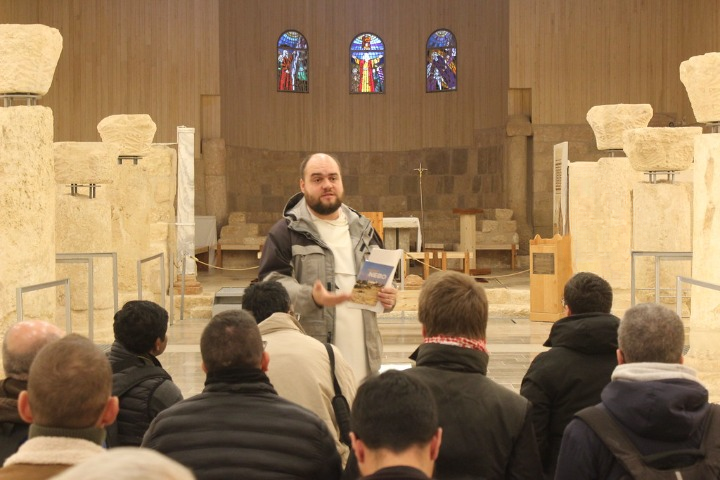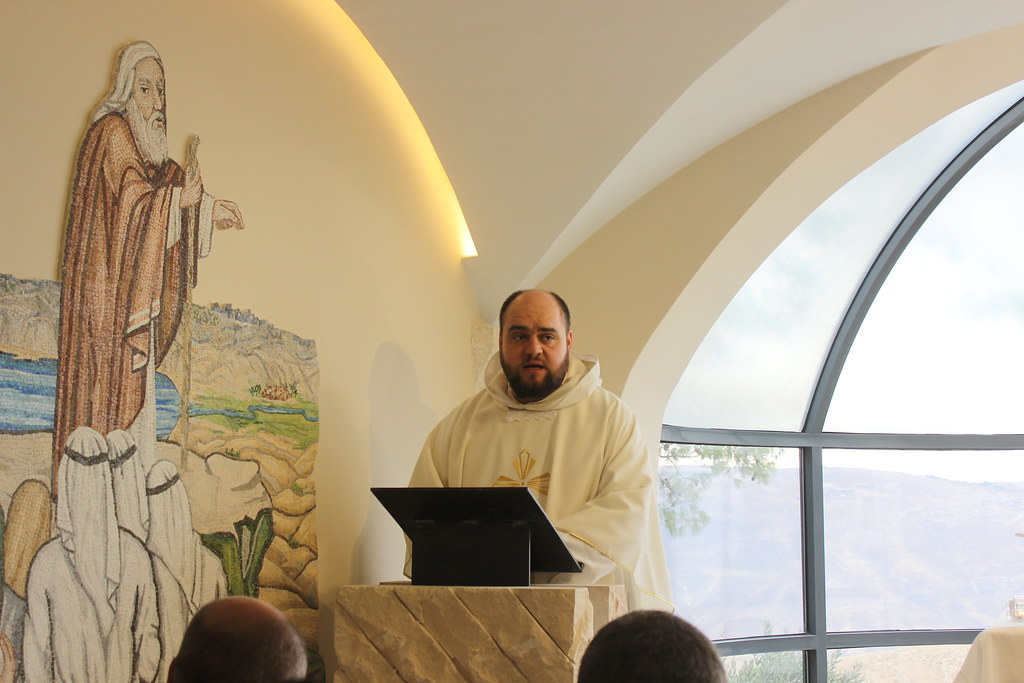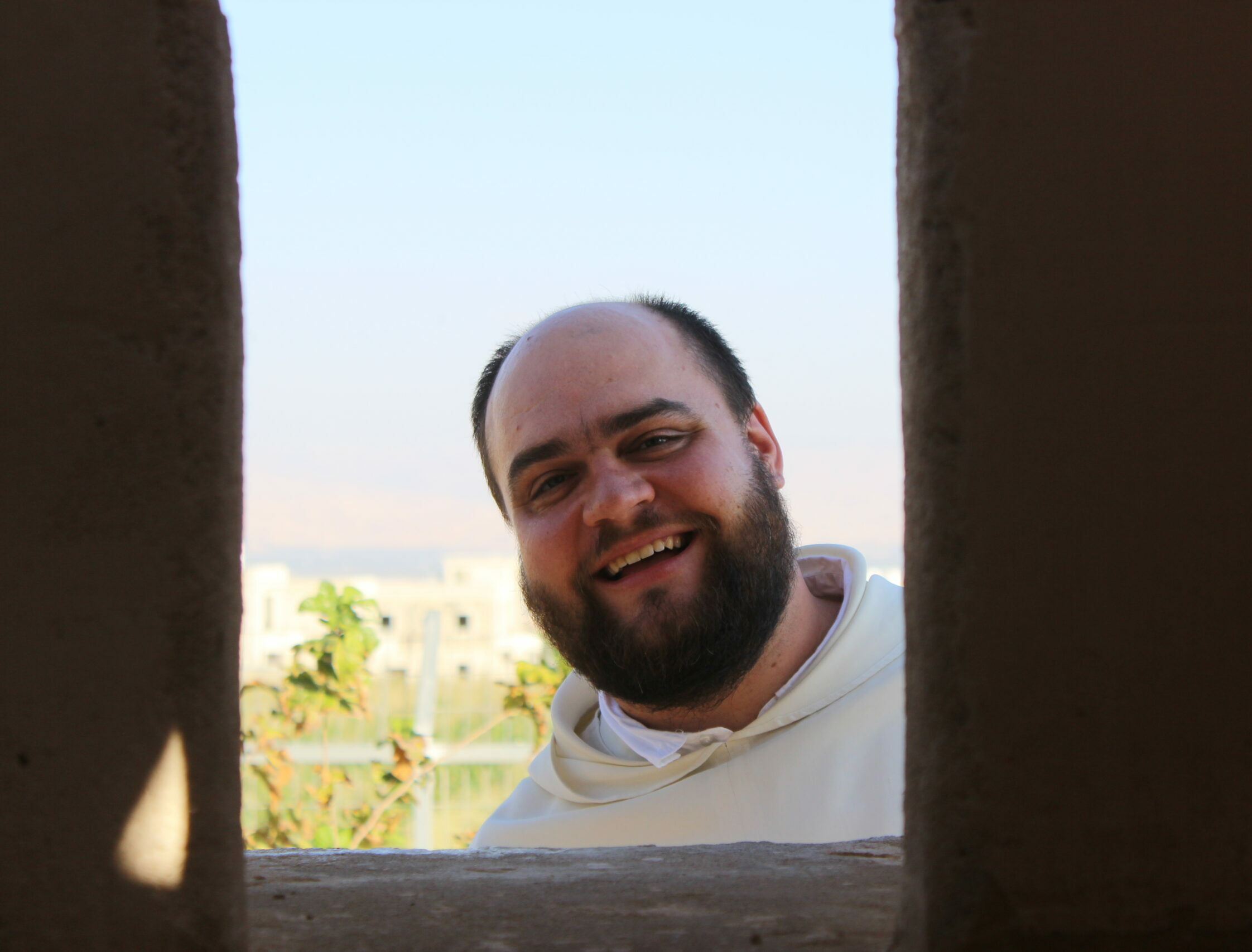First in a long summer series: (Re)discover the profiles of the scholars who studied at the École biblique et archéologique française de Jérusalem during the 2024–2025 academic year. Learn more about their backgrounds, motivations, and research projects.
Can you introduce yourself?
My name is Hyacint Ullman. I’m from the Czech Republic. I joined the Dominican Order in 2008 and was ordained a priest in 2016. I began my novitiate in Olomouc, continued my formation in Bordeaux, and from 2009 to 2015 I was based in the Province of Toulouse. I later returned to my home country, where I served as a chaplain at an archiepiscopal high school for eight years, after which I came for my first stay at the ÉBAF.
Why the ÉBAF?
Thanks to my studies in France, I had the opportunity to become familiar with French language and culture. Being here is truly exceptional—the access to all the historical sites, the courses in archaeology and topography, the library, and the knowledge shared by the professors—it’s all wonderful. My Provincial supported my desire to study at the ÉBAF, which made this experience possible.
What is your academic project?
My goal is to deepen my understanding of the Word of God through advanced studies. I will be here for two years, during which I plan to complete the ÉBAF diploma, then prepare for the baccalaureate, and eventually pursue a licentiate in Biblical Sciences in Rome, under the Pontifical Biblical Commission. This is an institution that publishes texts on the Bible, authored by scholars appointed by the Pope. Several of us at the ÉBAF are currently preparing for this exam.
What have you discovered since coming to the ÉBAF?
My first visit was five years ago with a small group of friends who used to attend Mass at the Basilica of Saint Stephen. What struck me this time is how everything feels brand new—the major renovations have really transformed the place. I’m very happy to be part of this fraternal community, which gathers several times a day for prayer. One of the great things is being able to work alongside the residents of the ÉBAF—not only the friars but also the students. There’s a fantastic atmosphere here.
Before arriving, I didn’t know anyone or what to expect, so this positive experience has been a real discovery. I particularly enjoy the topographical outings, which are completely new for me.
 Photo: ÉBAF, Ordo Prædicatorum. Fr. Hyacint explaining the Mount Nebo shrine to the students.
Photo: ÉBAF, Ordo Prædicatorum. Fr. Hyacint explaining the Mount Nebo shrine to the students.
What do you see as the strengths of the ÉBAF?
Certainly its library and location. I spend a lot of time at my study desk, although I make sure to walk for an hour each day—I go into the city, visit the holy sites, for example. It’s important to get out regularly. I’m currently preparing a project in the library for the end of the academic year. I’ve started working on Psalm 91, which begins, “It is good to give thanks to the Lord, to sing praise to your name, O Most High.” It expresses deep trust in God. At the library, I’m studying amulets that were supposedly used to ward off demons, first by Jews and later by Christians. I’m investigating whether these objects really existed and what their intended purpose might have been. In a way, I’m used to living near holy places. Here, we are very close to the origins of Christianity, but also to Fr. Marie-Joseph Lagrange, who is on the path to beatification. We seek truth through Scripture and love of God. This living communion with those who live and have lived in the convent goes beyond what one can see with the eyes—there are also the eyes of faith. At the site of the martyrdom of Saint Stephen, for instance, we celebrated All Saints’ Day three times in a single week. That’s the kind of richness you find here.
How do you reconcile reason and faith?
We trust in God and everything He revealed to us in Jesus. Prayer, meditation, and the rosary every day nourish the spirit—especially in Jerusalem, while visiting the holy places. This leads me to want to know more about God, to know Him better. Study and intellectual knowledge fuel the love I have for God—that’s the whole purpose of the Bible. We also study ancient languages. And there’s always joy in encountering the living Word of God, which transforms us. I don’t separate reason and faith—on the contrary, I see them as working together. They are like the two legs of one body: one cannot go without the other.
What does the Holy Land mean to you?
I feel like there are several levels to the Holy Land. First of all, I’d say that the entire Earth is holy because of Christ’s coming: every person, every country is touched by the grace of God, who is the source of all existence. I’ve experienced this throughout my Dominican life, as I’ve moved between convents and returned to my small hometown in the Czech Republic. God is omnipresent. Of course, this is a region deeply marked by politics, and by the presence of the three Abrahamic religions, each with its own internal divisions. Crossing a tram line in Jerusalem can feel like entering a different world—each neighborhood is completely different. Jerusalem is a multiplicity of worlds. And if you think of Tel Aviv or Jericho, they are completely different again—from the Mediterranean to the Jordan River, it’s not the same world. On a simpler level, I just want to discover the Holy Land more fully. Five years ago, I didn’t have time to see everything. Each visit is a chance to see things with fresh eyes.
 Photo: ÉBAF, Ordo Prædicatorum. Fr. Hyacint preaching at the Mount Nebo chapel.
Photo: ÉBAF, Ordo Prædicatorum. Fr. Hyacint preaching at the Mount Nebo chapel.
Has your stay in Jerusalem changed your perception of the Holy Land?
Five years ago, I didn’t know what to expect. I had a vague image of the mountains of Judea and the Jordan Valley depression, but reading the Bible already gives you a kind of mental map of these places. Being here now, I see and experience them very differently—in context, with all their historical and spiritual layers.
What would you say to someone thinking about studying at the ÉBAF?
It’s a very good idea. Don’t be afraid of the unknown—the distance, the unfamiliarity, or the circumstances. It’s truly worth coming. You have to experience it to understand the value of what the ÉBAF offers.
What message would you like to send to our benefactors?
Thank you so much! What the ÉBAF does is truly unique. The School continues its mission thanks to its professors, scholars, fellows, and priests—regardless of why they come here. It’s a one-of-a-kind community where the biblical text and its context are studied side by side.
Supporting the ÉBAF is supporting something that really matters, especially now—it’s like a peaceful bubble in a time of war, a place of serious study and shared humanity.

